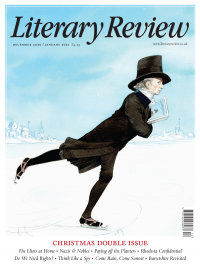H Kumarasingham
The Price of Freedom
The Interest: How the British Establishment Resisted the Abolition of Slavery
By Michael Taylor
The Bodley Head 400pp £20
Do you think a human life is worth £5,800? That was the upper end of the value placed on an individual African’s life (in today’s money) when compensation for slave ‘property’ was being negotiated in 1833. When emancipation came the year after in the British West Indies, it did not mean freedom. Instead, existing slaves became ‘apprentices’ and in many cases found themselves working for nothing in worse conditions than before, with flogging and chains remaining cruel fixtures of their existence. The system of apprenticeships, a euphemism for forced labour, was one of the concessions slaveholders obtained in exchange for agreeing to emancipation legislation. It guaranteed their wealth, as well as effectively preserving the slavery that underwrote it. No part of the money given by the British government went to those who had actually been in slavery or to their families. Vast amounts of compensation went instead to those enjoying a very different life: they included three dukes, one marquess, sixteen earls, two viscounts, fifteen barons and seventy-five baronets, as well as over a hundred Members of Parliament. Not everyone who owned slaves was so grand. They included over 150 minor Anglican clergymen, for instance, and a penurious young Inverness woman named Anna Fraser, who inherited a single slave. Mary Sutherland of London claimed that without compensation she faced ‘no other prospect than positive starvation’.
The slaveholders and their allies, numbering much of the British establishment, constituted the ‘West India Interest’. This group’s defence of slavery, powerful propaganda, well-financed political stratagems and manipulation of abolition for financial benefit are the subject of Michael Taylor’s excellent new book. Taylor analyses the years between 1807, when William

Sign Up to our newsletter
Receive free articles, highlights from the archive, news, details of prizes, and much more.@Lit_Review
Follow Literary Review on Twitter
Twitter Feed
How to ruin a film - a short guide by @TWHodgkinson:
Thomas W Hodgkinson - There Was No Sorcerer
Thomas W Hodgkinson: There Was No Sorcerer - Box Office Poison: Hollywood’s Story in a Century of Flops by Tim Robey
literaryreview.co.uk
How to ruin a film - a short guide by @TWHodgkinson:
Thomas W Hodgkinson - There Was No Sorcerer
Thomas W Hodgkinson: There Was No Sorcerer - Box Office Poison: Hollywood’s Story in a Century of Flops by Tim Robey
literaryreview.co.uk
Give the gift that lasts all year with a subscription to Literary Review. Save up to 35% on the cover price when you visit us at https://literaryreview.co.uk/subscribe and enter the code 'XMAS24'